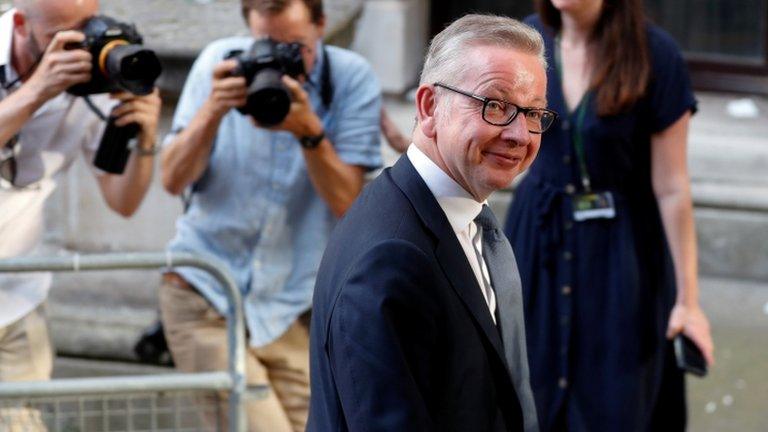Johnson in Scotland: PM says he is 'at one' with Ruth Davidson
- Published
New Prime Minister Boris Johnson said he was Scottish Conservative leader Ruth Davidson's "number one fan"
Every party conference has them; trigger lines which are guaranteed to draw a thunderous round of applause, accompanied by much cranial nodding.
For the Tories, it is, of course, the Union which generally sparks such responses. Or, if you are really trying to work the audience, "our precious Union".
For the SNP, in contradistinction, it is independence. But there is another trope which tends to make the rafters ring at Nationalist gatherings.
That is public condemnation of the Trident nuclear deterrent. Often expressed in terms of repelling the subs from Scottish waters.
So there was strategy behind Boris Johnson's choice of Faslane for his first Scottish visit as prime minister.
Symbols matter. And, with this, he was simultaneously summoning up a totem of UK power while aiming a swipe at the SNP who want to drive the deterrent away from the Clyde.
Mind you, an SNP strategist offered me an alternative version. Successive Tory PM visits of late have been to well-guarded venues, mercifully free of floating and possibly dissident voters.
Today, my interlocutor suggested, the tactic went one further. A military base, surrounded by barbed wire and guarded by sailors and armed police.
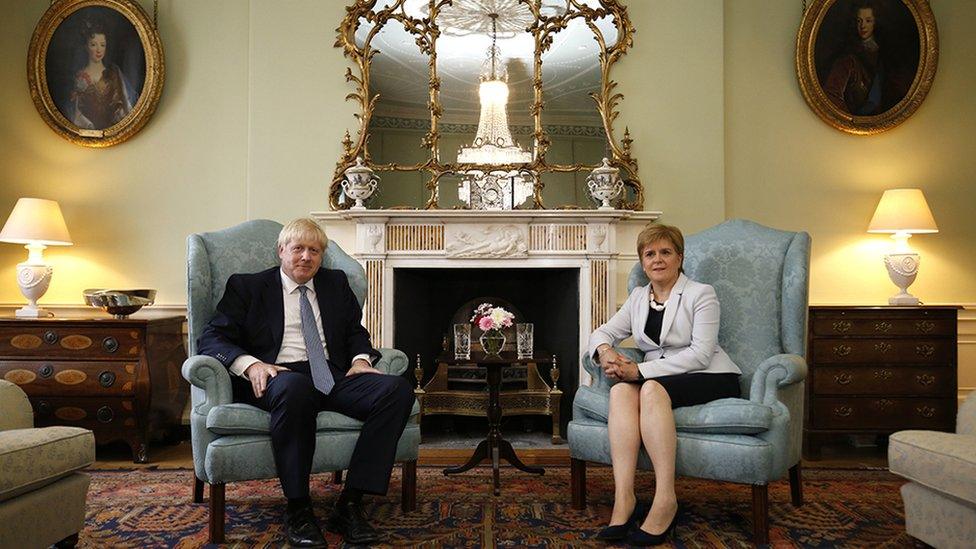
Nicola Sturgeon met with new PM Boris Johnson at her Bute House residence in Edinburgh
Still, Mr Johnson seemed to thrive aboard a Trident sub, as he chatted to the crew. He inquired about the grub - to be told it was all around him, crammed into every available space for a long tour.
He then noted that the "ship" seemed to be packed with officers and ratings. Somebody had to tell him. And, after a pause, somebody did. A submarine is a boat, not a ship.
The new PM, of course, has far bigger problems than naval terminology. There is, as ever, the European Union.
And today his particular problem was blue on blue. Firstly, he was obliged to deny Michael Gove's suggestion that UK Ministers were now operating on the understanding that No Deal would happen.
Secondly, there was Ruth Davidson. The Scottish Tory leader is not alone in saying that she is agin No Deal. But she has gone further, saying that she would not support it, should it be pursued.
Again, Mr Johnson rebutted this when I spoke to him at Faslane. He praised Ms Davidson to the skies, noting that they occupied roughly the same zone in the political firmament.
On No Deal, he backed her underlying concerns. He too was seeking an agreement with the European Union and remained confident that such was possible, indeed probable.
But there the two parted company. He insisted it was right, strategically, to maintain the option of No Deal.
What will Ruth Davidson do?
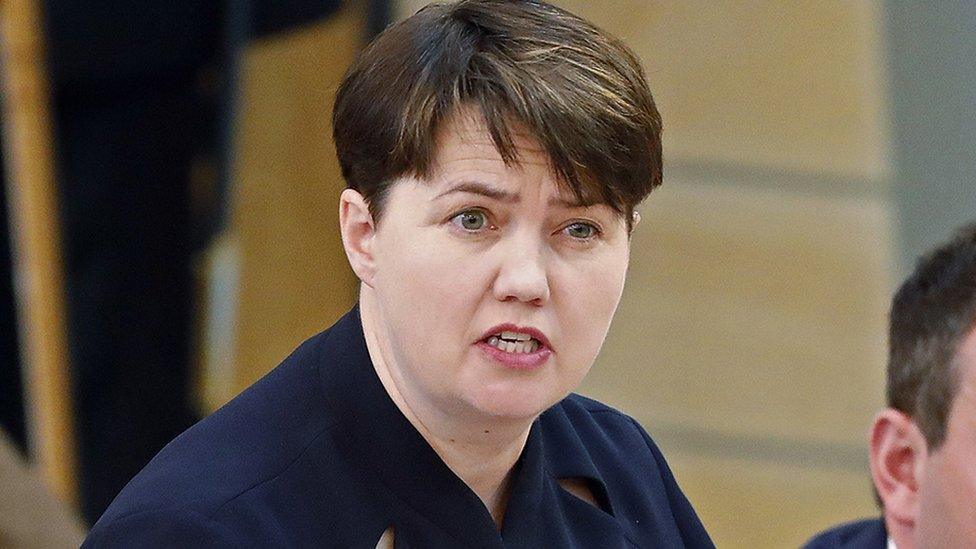
Scottish Conservative leader Ruth Davidson met Boris Johnson in private in Edinburgh
Let us say that option becomes reality - grim, desirable or unavoidable, according to taste.
What, in practice, would Ms Davidson do? Of course, of course, she hopes that this will not arise. She will exert what influence she has in that direction.
But say it does. Say there is no deal. Say the PM and his UK Cabinet colleagues decide that the UK must leave the EU on October 31, on WTO terms.
What then? Does Ms Davidson instruct or advise Scottish Tory MPs to vote in the Commons against such a position?
Would they follow her? I suspect that most would be inclined rather to obey the Tory whip in the Commons - under the impetus to maintain parliamentary unity and support their elected government.
If so, that might underline the anomaly of a semi-autonomous Scottish party whose MPs nonetheless fall into line with wider Westminster discipline, when required.
Would Ms Davidson feel obliged to consider her own position, in such circumstances?
PM: 2014 vote 'once in a generation'
Or would she calculate that such a move would only add to the party's problems and that more would be achieved by remaining at the helm and seeking, where possible, to mitigate the impact of developments?
As I write, Boris Johnson is in Bute House for talks with the First Minister. Nicola Sturgeon will emphasise her opposition to Brexit and, in particular, to No Deal.
She will also say that Scotland must have an alternative, via a further independence referendum - which she wants to hold next year.
I asked Mr Johnson about this too. He said that the 2014 ballot was run on the basis that it took place once in a generation. It would be "totally wrong" to diverge from that timetable.
What, I pressed, if the supporters of independence win a mandate at the next Holyrood elections. Mr Johnson repeated his first answer.
- Published29 July 2019
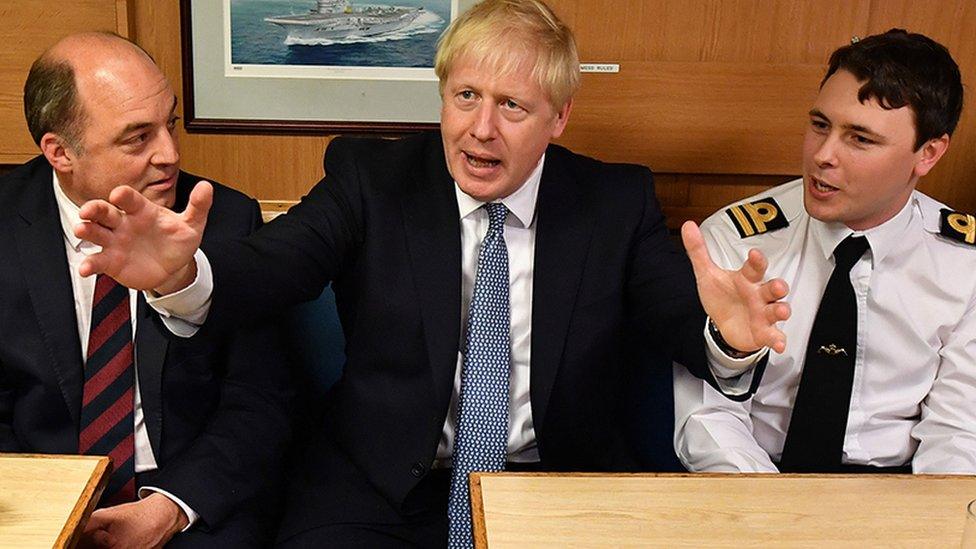
- Published29 July 2019
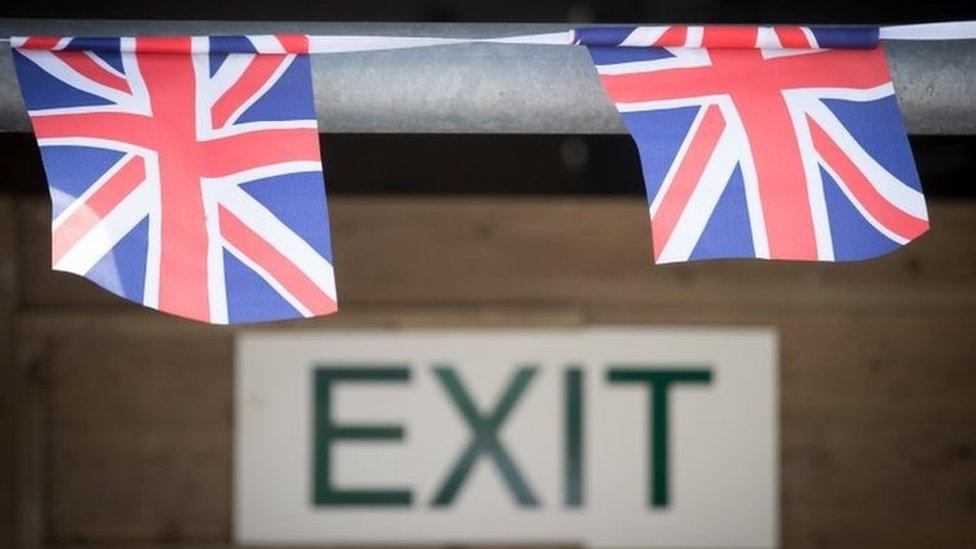
- Published28 July 2019
